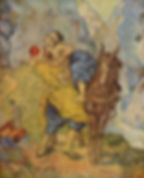Is Radical Empathy Our Only Hope? (Summary Version)
- Alexander Lang
- Apr 1, 2025
- 4 min read

Before you dive in, I’m doing something with this article I’ve never done before. As I wrote this piece, it became so long and involved that I realized the reader completion rate would be extremely low. I figured a practical solution would be to produce a short summary and provide the rest of the article after the summary. Unfortunately, in spite of my best efforts, the summary was approaching the size of one of my shorter articles.
Therefore, because I feel this is a very salient and critical reflection on our current circumstance, I’ve decided to provide you with the summary this month and the real, full-length article a few months from now. Thank you for reading and please enjoy this summary of what will hopefully cause you to pause and ponder the paths of resistance at our disposal.
A Symbiotic Relationship: Loneliness and Distrust
As we barrel towards a constitutional crisis where our checks and balances stop functioning due to an executive branch that is openly eschewing court rulings and a congress that turns a blind eye, I’ve been asking myself: How is the oldest democracy in the world flirting with fascism?
Polls indicate that trust in the government is at one of the lowest points in the history of our country (22%), which means 78% of citizens distrust the government. What I argue is that distrust of the government is a symptom of a larger problem. Since government is reflection of the citizens’ faith in their brothers and sisters to manage larger systems for the benefit of society, if the citizens distrust the government, then at the heart of this skepticism is a distrust of their neighbors.
Cultivating Empathy, Sympathy and Compassion
If we peel back the onion one more layer, what we find is that the distrust of our neighbors is a result of fraying community bonds. This has numerous causes, but the end result is isolation and loneliness, which has reached epidemic proportions. Utilizing a unique experiment performed with the larvae of Indian meal moths, I explain how empathy, sympathy and compassion (the keys to a harmonious society) cannot be learned in isolation.

Empathy, sympathy and compassion are formed by dealing with friction and conflict in the midst of community. When I’m interacting with someone with whom I disagree in my community, that conflict forces me to understand a differing perspective, which is how we develop empathy, sympathy and compassion. Therefore, if I’m isolated and I don’t have to work through conflict, then I’m never forced to hear other perspectives, creating an echo chamber in my own mind.
Hence, the isolation and lack of community bonds breeds distrust in our neighbors, which translates into distrust of the government. Historically, high levels of government distrust are the magical cue for fascist-leaning leaders to highjack a political system. This is due to their message that they alone have the capacity to fix an irreparably broken system. Ultimately, this results in them dismantling the current political system so they can claim absolute authority.
A History of Violence
Once entrenched, the only way to extricate totalitarian leaders and their supporters is via violence and usually war. Interestingly, war is a fast track to creating community bonds. When a country is fighting a war against a common enemy, the whole society must work together in order to survive. One hundred years ago, when fascism took hold of governments across the globe, the world went to war and the survivors came back feeling bonded. Following WWII, trust in the United States government was as high as 77 percent.

This indicates that our society fluctuates back and forth between communalism (where we trust each other and the government) and individualism (where our community bonds dissipate creating governmental distrust). Given this cycle, there is a pressing question we must consider: Is violence and war inevitable or can we reclaim those community bonds without bloodshed?
On the one hand, our species has always dealt with outliers via violence. In ancient hunter-gatherer societies, which were fiercely egalitarian, when a member of the group tried to take control and become the dominant leader, the men would take him away from the camp and there would be an “accident” in which the offending member would be killed. One could argue that World War II was a global version of what used to happen among small bands of our kin.
On the other hand, humans are not automatons. We do have free will and we can choose to be in community. We can choose to love rather than distrust our neighbor. We can choose to surround ourselves with people who possess differing views from our own. If we’re willing to have smaller conflicts in our communities where we have to compromise, then we will develop the empathy, sympathy and compassion required to stop the larger conflicts from escalating.
An Unlikely Solution
How do we engage Option 2 over Option 1? Honestly, all it takes is for the 62% of people in the United States who identify as Christian to actually take seriously Jesus’ teaching to love our neighbor. What Jesus requests of his followers is radical empathy: Love your enemy and turn the other cheek. But that can only happen when we live as Jesus lived, actively seeking out diverse communities. Absent this effort, we will default back to Option 1 and I fear the bloodshed this time may be far greater than anything humanity has ever witnessed.

Practical Suggestion: Spend regular time with at least three people who think very differently from yourself. Force yourself into uncomfortable conversations. Yes, there will be friction and disagreement, but out of the friction all of you will develop greater empathy, sympathy and compassion.
